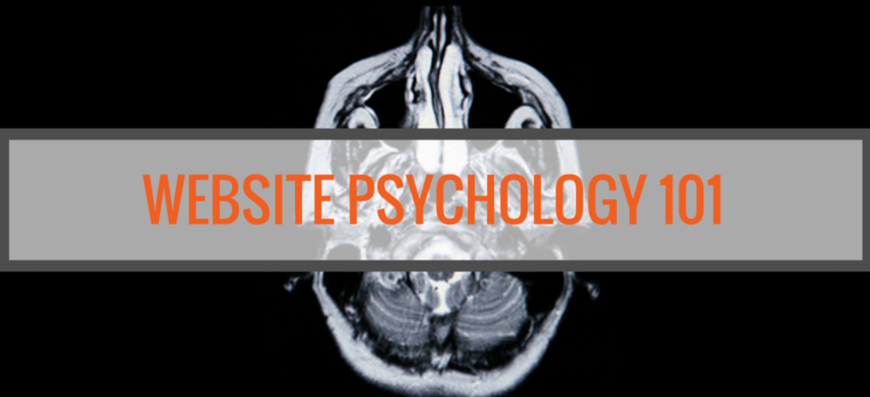Are you considering an investment in your small business by building a website? The good news - An effective website can help your business reach new customers and boost your bottom line. The bad news - A poorly designed website not only doesn’t help your business grow, it can cause customers to lose confidence in your business and head elsewhere. Understanding what makes a powerful website from your customers perspective ensures a better user experience and more success out of your website. Whether you plan to invest money by hiring someone to build it for you or invest time building your own website, knowing some website psychology basics can help you get the most out of your investment.
Here’s 4 principles of psychology to keep in mind when building your website:
Pattern Recognition
As humans, our brains are wired to constantly seek out what we recognize. Recognizing patterns helps us understand and navigate our surroundings. If we come across an unfamiliar situation, our brains may interpret it as a threat, triggering a chemical “fight or flight” response. [source]
However, familiarity lends itself to trust. If your website fits the “website pattern”, your customers are more likely to inherently trust your website and business. Upon landing on your business’s website, your customers will make snap judgements (in less than 1 second!). Instilling trust right away improves the chances of your customers staying on your website after their first impression. Your website should include the basics like your logo, obvious navigation, and banners with high-quality images balanced with easy-to-read text to maintain a recognizable “website pattern”.
Cognitive Overload
From a user-experience perspective, cognitive load is the amount of mental effort required for your customers to navigate your website. The original definition of cognitive load, first used by psychologists, defines cognitive load as the mental effort required to learn a new task. For your customers, the new task is to understand how your website differs from other websites then adjust to their behaviour to effectively use the website. The cognitive load required affects how easy it is for your customers to find the information they’re looking for on your website - and as a small business, you want to make it as easy as possible! [source]
The first step to make things easier for your customers (aka reducing cognitive load), is to know what they’re looking for when they visit your website. Are they looking for food/service menus, your blog, products you sell, information on products/services, or contact details? Then, focus on presenting the information in an easy-to-find way. To reduce the risk of cognitive overload in your website visitors, keep your website as simple and clean-looking as possible. Each piece of content on your website should provide valuable info. Using keywords at the top of your website, like in the navigation bar, help customers understand and navigate quickly.
Attention
Human brains are designed to pay attention to anything different or unique in our surroundings. From an evolutionary perspective, humans noticing something out of the ordinary was developed as a survival tactic to judge potential threats. [source]
Though there aren’t any threats on your website, marketers can take advantage of this human tendency by creating a visually unique Call-To-Action. Draw customers’ attention to your offer with colours, images, or typefaces. For example, a bright orange “Start Your Free Trial” button against a neutral background will immediately catch your eye, drawing attention to what you want your customers to do. For your customers to be able to respond to your call-to-action, they need to know where it is. For the best results, make it easy for them to find by ensuring it stands out from the rest of your website.
Information Scent
With roots in Information Foraging Theory, information scent can be traced back to the earliest humans hunting for food. The scent of information describes our ability to judge whether or not we will find what we’re looking for by following a certain path. Humans are designed to look for cues that point us in the right direction as we hunt for information. The hunt boils down to two factors - motivation and effort. What will I gain by following this cue (motivation)? and is this a worthy use of my energy (effort)? [source]
Tap into your customers’ natural instinct to know where to look for information. Descriptive navigation tabs and meaningful subheadings initiate a strong information scent. Maintain the scent with images and further text descriptions on landing pages. Like cognitive load, the goal is to make things as easy as possible for your customers. Even if you have a lot of products or subcategories, studies show that customers don’t mind clicking several times, as long as they believe they are headed in the right direction. If the cues on your website don’t support humans tendency to follow the information scent, they’ll likely become frustrated and head back to Google to continue their search.
Conclusion
Investing time and money into your website can be invaluable for your business but it’s important to understand the underlying factors of website success. Using science-backed tactics to instil positive feelings in your website visitors means better chances of reaching new customers, increasing awareness and building sales. Time and money are both extremely valuable to small businesses; keep these website psychology basics in mind to maximize your investment in your website.
Don’t want to waste time or money on your website? Webware’s professional team ensures your website is optimized for user-experience and setup for success.




